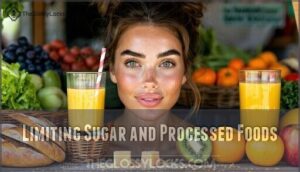This site is supported by our readers. We may earn a commission, at no cost to you, if you purchase through links.

Start with a gentle cleanser and moisturizer suited to your skin type.
Apply broad-spectrum sunscreen daily—it’s your best defense against premature aging.
Eat antioxidant-rich foods like berries and leafy greens while staying hydrated with plenty of water.
Get adequate sleep and manage stress, as both directly impact your skin’s appearance.
Exercise boosts circulation, giving you that natural glow.
Avoid harsh scrubbing and over-washing, which can strip your skin’s protective barrier.
These evidence-based strategies create lasting changes beyond surface-level fixes, using simple daily habits.
Table Of Contents
- Key Takeaways
- Skin Health Fundamentals
- Improve Skin Health Naturally
- Effective Skincare Practices
- Nutrition for Healthy Skin
- Lifestyle Changes for Better Skin
- Frequently Asked Questions (FAQs)
- How can I improve my skin health?
- How to improve lifestyle for better skin?
- What are some effective skin care tips?
- How can I protect my skin from aging?
- How can I improve my skin naturally?
- How can I get 100% clear skin?
- How do you fix unhealthy skin?
- Which food is good for skin?
- Can hormonal changes affect my skin condition?
- How does aging naturally impact skin appearance?
- Conclusion
Key Takeaways
- Establish a simple daily routine – You’ll see the best results by consistently using a gentle cleanser, moisturizer, and broad-spectrum SPF 30+ sunscreen every day, rather than trying complex treatments.
- Nourish your skin from within – You can transform your complexion by eating antioxidant-rich foods, like berries and leafy greens, drinking plenty of water, and getting 7-9 hours of quality sleep nightly.
- Manage stress and stay active – You’ll notice clearer skin when you practice stress management techniques and exercise regularly, as both boost circulation and support your skin’s natural repair processes.
- Protect against environmental damage – You can prevent premature aging by avoiding smoking and excessive alcohol, applying sunscreen daily, and cleansing thoroughly to remove pollutants that break down collagen.
Skin Health Fundamentals
Your skin is your body’s largest organ and serves as your first line of defense against environmental damage, making its health essential for both protection and overall well-being.
Understanding your skin type and the factors that influence skin health helps you make informed decisions about care routines that can prevent premature aging and maintain your skin’s natural barrier function.
This understanding is crucial for overall well-being, as it enables you to take proactive steps in protecting and caring for your skin, ultimately leading to better health outcomes.
Importance of Skin Health
Your skin’s vitality serves as your body’s first line of defense, protecting against 84.5 million Americans’ shared struggle with skin diseases.
Your skin protects millions while reflecting your inner health—make it count.
This remarkable organ regulates temperature, produces vitamin D, and reflects your overall health status.
5 Key Skin Benefits You Can’t Ignore:
- Pathogen Protection – Your skin barrier blocks bacteria and viruses from entering your system
- Temperature Control – Healthy skin maintains ideal body temperature through natural regulation
- Vitamin D Production – Sun exposure on healthy skin supports bone health and immune function
- Fluid Balance – Proper skin wellness prevents excessive moisture loss and dehydration
- Inflammation Defense – Intact skin prevents inflammatory chemicals from accelerating systemic aging
Understanding these fundamentals empowers you to take control of your dermatological care.
When your skin barrier functions properly, you’re not just achieving that coveted healthy glow—you’re supporting your entire body’s defense system.
Natural remedies and proper skin nutrition work together to maintain this protective shield, making skincare an investment in your long-term health rather than just cosmetic enhancement.
To maintain healthy skin, following skin health guidelines and consulting with dermatologists regularly is necessary.
Skin Types and Characteristics
Understanding your skin type is the foundation of effective skincare.
The tissue test reveals key characteristics: Normal Skin shows balanced moisture without excess oil, Dry Skin feels tight with minimal oil production, Oily Skin leaves greasy residue on tissue, Combination Skin displays mixed zones, and Sensitive Skin reacts easily to products.
Each skin type requires personalized care approaches to address its unique needs, making it crucial to identify and understand your specific skin type for optimal results, which is essential for effective skincare routines.
Role of Diet and Hydration
What you eat directly affects your skin health through nutrient balance and hydration tips.
Your plate is your skin’s best medicine—feed it right, and it shows.
Your body needs protein, vitamins A, C, and E, plus omega-3 fatty acids for collagen production.
Watch for food allergens that trigger breakouts.
Digestive health impacts skin clarity, so eat fiber-rich foods.
Drink quality water daily—your skin cells need proper hydration to function at their best, which is crucial for overall skin health.
Impact of Lifestyle on Skin
Your lifestyle habits shape your skin’s appearance more than you might realize.
Stress effects include increased cortisol production, making skin oilier and more acne-prone. Poor sleep patterns disrupt overnight repair processes, while regular exercise benefits include improved blood circulation that delivers essential nutrients.
Environmental exposure to pollution and UV rays accelerates aging, making smart lifestyle choices your skin’s best defense against premature damage.
Understanding healthy skin habits is essential for developing an effective skincare routine that addresses these complete concepts, including the impact of stress effects and the importance of regular exercise, to achieve healthy skin.
Improve Skin Health Naturally
Your journey toward radiant skin doesn’t require expensive treatments or harsh chemicals. Natural remedies and holistic wellness approaches can transform your complexion from the inside out.
By embracing mindful eating and herbal skincare practices, you’re taking control of your skin’s destiny. Natural skincare methods work with your body’s own healing mechanisms.
Here are three powerful approaches:
- Skin detox through hydration – Drink water with lemon to flush toxins and boost cellular renewal
- Herbal skincare rituals – Apply green tea compresses or aloe vera gel to reduce inflammation naturally
- Mindful eating practices – Choose antioxidant-rich foods like berries and leafy greens for skin nutrition advice that actually works
These skin rejuvenation methods offer real skin health benefits without side effects. Your skin wellness guide starts with understanding that true beauty comes from nourishing your body naturally, creating lasting changes that synthetic products simply can’t match.
Effective Skincare Practices
A good skincare routine doesn’t need to be complicated—just consistent. The three basics you’ll want to master are cleansing, moisturizing, and protecting your skin from the sun’s harmful rays.
Cleansing and Moisturizing
Maintaining your skin’s natural pH balance through proper cleansing prevents irritation and dryness.
Choose gentle products like fragrance-free cleansers that won’t strip essential oils.
Your skin care routine should include a mild facial cleanser followed by a noncomedogenic moisturizer.
This simple approach supports skin hydration while avoiding harsh ingredients that disrupt your skin’s protective barrier, keeping your complexion healthy and balanced.
Understanding effective skin care habits is vital for achieving healthy skin health and addressing specific skin concerns, which requires a proper cleansing routine and gentle products to maintain a healthy complexion.
Sunscreen and UV Protection
Shield your skin from harmful rays with daily sunscreen application – it’s your first line of defense against premature aging and skin cancer.
Broad spectrum sunscreen with SPF 30+ blocks up to 98% of UV radiation when applied correctly.
Essential UV protection facts:
- Daily sunscreen use reduces melanoma risk by 50%
- SPF 15+ prevents DNA damage from UVB radiation
- Water-resistant formulas last 40-80 minutes during activities
- Physical sunscreens with zinc oxide suit sensitive skin better
- Reapplication every two hours maintains maximum protection
Using products with uv protection ingredients can enhance your skincare routine and provide additional benefits against sun damage.
Exfoliation and Skin Renewal
Exfoliation removes dead skin cells that accumulate on your surface, revealing fresh, healthy skin underneath.
You’ll want to exfoliate once or twice weekly using gentle exfoliants like chemical peels or facial scrubs.
Microdermabrasion offers professional skin resurfacing for deeper renewal. Overdoing it triggers oil overproduction and breakouts, so stick to this schedule for ideal skin regeneration and rejuvenation.
Understanding chemical peel benefits can help you make informed decisions about using chemical peel products for your skincare routine.
Choosing Gentle Skincare Products
Your skin care products should work with you, not against you.
Choose gentle cleansers that won’t strip your skin’s natural barrier, especially if you have sensitive skin.
Look for fragrance-free, noncomedogenic formulas that won’t clog pores.
Natural moisturizers with hypoallergenic ingredients keep your skincare routine simple and effective without causing irritation.
Using a gentle skin cleanser is essential for maintaining healthy skin.
Nutrition for Healthy Skin
What you eat directly impacts your skin’s health, appearance, and aging process.
The right nutrients can strengthen your skin barrier, boost collagen production, and protect against environmental damage that leads to wrinkles and spots, which is crucial for maintaining healthy skin and a strong skin barrier.
Antioxidant-Rich Foods and Supplements
Your body’s defense against free radicals starts with what you eat.
Antioxidants like Vitamin C Benefits from citrus fruits and berries neutralize skin-damaging molecules while boosting collagen production.
Polyphenol Rich foods including nuts and Green Tea Effects provide UV protection.
Consider Antioxidant Supplements like selenium or vitamin E for additional support when whole foods aren’t enough.
Omega-3 Fatty Acids and Skin Elasticity
Omega-3 fatty acids act like your skin’s personal bodyguard against aging.
These essential fats boost skin elasticity by strengthening cell membranes and reducing inflammation that breaks down collagen.
Top Omega-3 Sources for Better Skin:
- Fatty fish – Salmon, mackerel, and sardines pack the most potent anti-aging effects
- Fish oil supplements – Convenient daily doses when you can’t eat fish regularly
- Plant sources – Walnuts, flaxseeds, and chia seeds offer skin-friendly omega-3s
- Algae supplements – Vegetarian option with powerful skin elasticity benefits
Hydration and Water Intake
Daily water intake transforms your skin’s appearance through enhanced hydration and barrier function. Consuming 2.25 liters increases skin density by 20% within four weeks.
Proper fluid balance prevents 40% more wrinkles while boosting blood flow by 30%.
| Daily Water Amount | Skin Benefit | Timeline |
|---|---|---|
| 500ml (2 cups) | 30% increased blood flow | Immediate |
| 1.5 liters | Improved elasticity | 1-2 weeks |
| 2.25 liters | 20% density increase | 4 weeks |
| 3 liters | Ideal barrier function | 6-8 weeks |
| Consistent intake | Reduced dehydration effects | Ongoing |
The table provides a clear breakdown of the benefits associated with different levels of daily water intake, highlighting the importance of consistent intake and its effects on skin health over various timelines.
Limiting Sugar and Processed Foods
Your body craves balance, but sugar and processed foods sabotage your skin’s natural defenses.
These inflammatory culprits accelerate collagen breakdown and worsen acne. Sugar reduction starts with reading labels—hidden sugars lurk everywhere.
Swap processed snacks for whole foods like nuts and fruits. Nutrition planning becomes your secret weapon.
A balanced diet rich in antioxidants fights free-radical damage while supporting your skin’s repair mechanisms. Incorporating an anti aging diet can have a significant impact on overall skin health and appearance.
Lifestyle Changes for Better Skin
Your lifestyle choices directly impact your skin’s health and appearance more than you might realize.
Simple changes to your daily habits can transform dull, problem-prone skin into a radiant complexion that reflects your overall well-being.
Managing Stress and Sleep
Managing stress and sleep quality directly impacts your skin health through the brain-skin axis.
Chronic stress elevates cortisol levels, increasing oil production and triggering inflammatory responses that worsen acne, eczema, and other skin conditions.
Here’s how stress and sleep affect your skin:
- Stress triggers oil overproduction – leading to clogged pores and breakouts
- Poor sleep disrupts skin barrier function – causing dryness and irritation
- Sleep deprivation accelerates aging – reducing collagen production and elasticity
- Stress delays wound healing – making existing skin issues persist longer
Incorporating relaxation techniques like mindful meditation and establishing calming routines can break this cycle.
Prioritize 7-9 hours of quality sleep nightly and practice stress management strategies to support your skin’s natural repair processes.
Regular Exercise and Blood Circulation
Regular exercise transforms your skin by boosting blood flow and circulation.
When you work out, your heart pumps oxygen-rich blood to skin cells, delivering essential nutrients while removing waste products.
This circulation boost enhances skin oxygenation, promoting cellular repair and giving you that post-workout glow.
Even moderate physical activity like brisk walking improves cardio health and skin appearance naturally.
Incorporating an anti aging skin care routine into your lifestyle can further enhance these benefits of regular exercise, leading to improved overall skin appearance.
Avoiding Smoking and Excessive Alcohol
Smoking accelerates skin aging through collagen breakdown and reduced blood flow, while alcohol consumption increases non-melanoma skin cancer risk by 7-11% per 10-gram daily increase.
Both habits compromise your skin’s natural repair mechanisms.
Quitting strategies include nicotine replacement therapy and gradual reduction plans.
Seek addiction help from healthcare professionals to break free from these skin-damaging habits permanently, using addiction help.
Protecting Skin From Environmental Factors
Environmental threats constantly bombard your skin, but smart protection strategies can shield you from damage.
Air pollution and UV rays accelerate aging by breaking down collagen, while humidity changes disrupt your skin barrier.
Use broad-spectrum sunscreen daily, cleanse thoroughly to remove pollutants, and maintain consistent water quality for washing.
Climate change intensifies these challenges, making environmental skin protection more essential than ever.
Frequently Asked Questions (FAQs)
How can I improve my skin health?
Like a garden needing consistent care, your skin thrives with simple daily habits.
Use gentle cleanser, moisturizer, and SPF 30+ sunscreen.
Eat nutrient-rich foods, stay hydrated, get adequate sleep, and manage stress effectively.
How to improve lifestyle for better skin?
Prioritize quality sleep, manage stress through meditation or yoga, exercise regularly for better circulation, quit smoking, limit alcohol intake, and protect yourself from UV exposure with clothing and shade.
What are some effective skin care tips?
While complex routines promise miracles, simple consistency delivers results.
Use a gentle cleanser morning and night, apply broad-spectrum SPF 30+ sunscreen daily, and moisturize regularly.
Don’t over-exfoliate—once weekly’s enough to avoid irritation.
How can I protect my skin from aging?
Use broad-spectrum SPF 30+ sunscreen daily, eat antioxidant-rich foods, stay hydrated, get quality sleep, avoid smoking and excessive alcohol, manage stress, and maintain a gentle skincare routine with cleanser and moisturizer.
How can I improve my skin naturally?
Focus on hydration by drinking plenty of water daily.
Eat antioxidant-rich foods like berries and leafy greens.
Get adequate sleep for skin repair.
Exercise regularly to boost circulation and deliver nutrients to your skin cells naturally.
How can I get 100% clear skin?
Perfect skin isn’t achievable—skin naturally has pores, texture, and variation.
However, you’ll maximize clarity through consistent cleansing, moisturizing, sunscreen daily, managing stress, eating nutrient-rich foods, staying hydrated, and getting adequate sleep.
For ideal skin repair, these practices are essential, as they work together to improve the overall health and appearance of the skin.
How do you fix unhealthy skin?
Start with basics: gentle cleanser, fragrance-free moisturizer, and SPF 30+ sunscreen daily. Add balanced nutrition with antioxidants, adequate hydration, quality sleep, and stress management. Consistency trumps perfection.
Which food is good for skin?
Colorful fruits and vegetables pack antioxidants that shield your skin from damage.
You’ll want omega-3 rich fish, nuts, and seeds for elasticity.
Dark chocolate, green tea, and tomatoes offer protective compounds that keep skin healthy.
Can hormonal changes affect my skin condition?
Yes, hormonal fluctuations dramatically impact your skin’s behavior. During puberty, menstruation, pregnancy, and menopause, shifting hormone levels trigger increased oil production, breakouts, sensitivity, and texture changes you’ll definitely notice.
How does aging naturally impact skin appearance?
As you age, your skin naturally loses collagen and elastin, leading to wrinkles, sagging, and reduced firmness.
You’ll notice decreased oil production, slower cell turnover, and thinner skin that bruises more easily and heals slower, which can be attributed to the loss of elastin.
Conclusion
Achieving radiant skin doesn’t require expensive treatments or complicated routines.
By implementing these evidence-based strategies on how to improve skin health, you’ll notice visible improvements within weeks.
Remember, consistency trumps perfection—your skin responds better to gentle, regular care than sporadic intensive treatments.
Start with one or two changes, then gradually build your routine, and your future self will thank you for investing in these simple yet powerful habits today.
- https://newsinhealth.nih.gov/2015/11/keep-your-skin-healthy
- https://www.healthline.com/health/beauty-skin-care/skin-care-tips
- https://pmc.ncbi.nlm.nih.gov/articles/PMC11723311/
- https://vegasvalleyvein.com/skin-care/13-changes-for-healthy-skin/
- https://links.e.response.mayoclinic.org/EmailPreview-GeneralHealth









